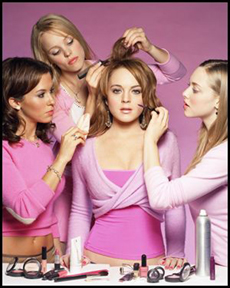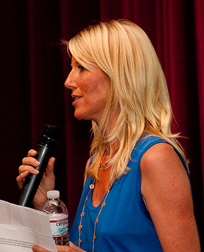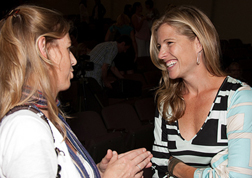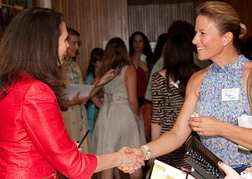
Girls have earned the cultural labels of being "catty" or even being "meaner" than boys. But is this stuff true?

Research has shown that at an early age, girls learn to mask anger in their facial expression more than boys. Research has also shown that when girls mask or deny anger, it emerges in others ways such as gossiping, excluding, insulting, and other forms of social manipulation (aka "relational aggression"). These are basically indirect ways of expressing anger, and unfortunately earn girls those negative labels.
But are girls really meaner?
Not so in a women's entrepreneurial community I just joined called SMARTY. SMARTY, based in Los Angeles, is built on the foundation of women helping women create (or continue to grow) a profitable, sustainable business. This is done by generously sharing resources, ideas, and ongoing educational opportunities -- all with the aim of supporting each other's success.

In the words of the founder of SMARTY, Amy Swift-Crosby: "I didn't set out to make generosity a foundation of what we do. It was more inherent. I have to remind myself to mention it at every event when I am talking to new people about who we are because it's so day-to-day for all of us," said Amy in an interview with me this week. She added: "I think it comes as a real surprise and joy for women who join the membership and realize, 'Wow! I never knew this existed. How did I miss this all this time?'"

I am one of those people. I recently joined SMARTY and have been blown away by the support of the women in the community and the generosity of resource-sharing that didn't necessarily exist in my earlier circles. At SMARTY, there is a real passion to share, give, and see other women fly into their potential.
Another women's entrepreneurial group that puts generosity first is eWomenNetwork. Their philosophy is that by giving and being "other-focused," you create a world of abundance for everyone. Their goal is to help women achieve, succeed and prosper in their business. They also have a Foundation to help other not-for-profits whose mission is to serve and empower underserved women and girls. "eWomenNetwork members and supporters are by far the most generous, friendly, caring and thoughtful women on the planet," says member Katrina Sawa of Sacramento, CA.
"I think for anybody who is in the community, it's their waking reality that there is a team and a family of people there who can answer questions and be supportive and vote on their video that they are submitting to Oprah, and so forth."
- Amy Swift-Crosby, founder of SMARTY
So what's the scoop with girls being mean to other girls and this later translating into women being mean to other women?
"Some research that looks at emotion has found that parents show greater acceptance of anger in boys and greater acceptance of fear in girls, and girls show more fear, boys more anger," says Sharon Lamb, Ed.D in her book The Secret Lives of Girls.
We probably just needed to look at our own lives to figure that one out. However, researchers Deborah Cox, Ph.D., Sally Stabb, Ph.D, and Karin Bruckner, M.A., L.P.C, in their book Women's Anger, go further. They explain that because anger for a woman is a feeling that she can't readily embrace or give voice to in herself, it changes "from an instrument of self-clarification to a weapon of self-destruction." Think: eating disorders, cutting, and self-sabotage.
According to Dr. Lamb, who is a professor of mental health at University of Massachusetts, the problems with suppressing anger are many. "Girls know themselves less. They run the risk of heavy social disapproval for slippages. People generally come to see women as more manipulative and cunning, less trustworthy, ..." she says.
Okay, so how do we stop the cycle?
 "When there is persistent failure to bond, to be heard, and to be understood, girls learn unhealthy relational patterns that can last into adulthood," says Cheryl Dellasega, Ph.D., author of Mean Girls Grown Up. She says that women who have never had true female friends, who avoid activities because they involve women, or who deliberately work in male-dominated environments because they don't like women, are everyday examples of a basic failure to connect with peers.
"When there is persistent failure to bond, to be heard, and to be understood, girls learn unhealthy relational patterns that can last into adulthood," says Cheryl Dellasega, Ph.D., author of Mean Girls Grown Up. She says that women who have never had true female friends, who avoid activities because they involve women, or who deliberately work in male-dominated environments because they don't like women, are everyday examples of a basic failure to connect with peers.
"Women feel closer and validated through communication, dialogue and intimate sharing of experience, emotional content and personal perspectives," says Michael Connor, Psy. D., a psychologist from Oregon who practices in clinical, family and medical psychology.
 As an adult woman, I think one step to stop the "Mean Girl" cycle is to get involved with a supportive women's group. To add to Dr. Dellasega's and Dr. Connor's points, I believe that when a woman is seen, heard, and encouraged by other women, there is some magic that happens.
As an adult woman, I think one step to stop the "Mean Girl" cycle is to get involved with a supportive women's group. To add to Dr. Dellasega's and Dr. Connor's points, I believe that when a woman is seen, heard, and encouraged by other women, there is some magic that happens.
If you are a female entrepreneur, groups like SMARTY, eWomenNetwork, Ladies Who Launch, or First Tuesday are great options to connect with outstanding women. Whatever group you may choose, I think if we as women gather together in the truth of our vulnerabilities, fears, needs, dreams, desires, and passions, we will be creating an expansive space to raise our daughters, granddaughters, nieces, students, and other amazing girls in our lives and in the world.
So what do we do about anger?
That's coming in another blog.
